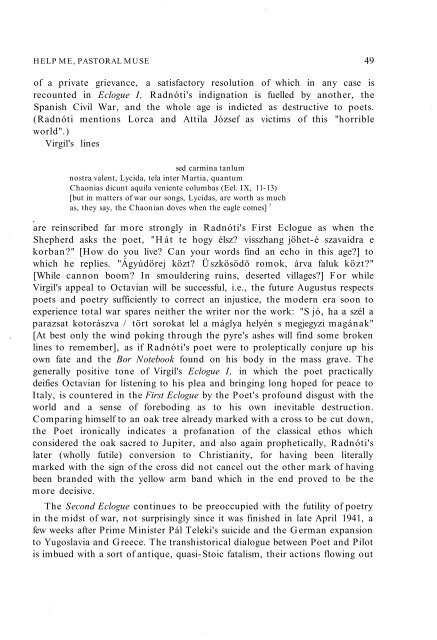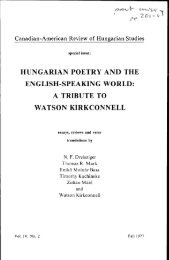48 LÁSZLÓ K. GÉF1Nterm, the "nonsacred" and "decanonized" character of Virgil's Arcadia (deMan 97-98). By calling, somewhat brazenly, his own series of poems "eclogues,"Radnóti lures the so-called cognescenti into believing that nothingmatters but some fundamental affinity between Virgil's work and his own,only to confound them by almost constant ironic reversals and displacements.It is important to note in this connection that an element introduced in thelater eclogues is the allusions to the Hebrew prophets, notably Isaiah andNahum, after a somewhat earlier reference to Habakkuk. For someone likeRadnóti who refused to consider himself a Jew but wanted more than anythingto be taken for "just" a Hungarian, and in no sense a "Jewish-Hungarian"poet, the appearance of the prophets signifies not only a return of the repressedbut far from being a kind of "syncretism" of classical and biblical authority,as some critics have suggested, the latter proves to be a corrective to the ruinsof the classical ideal.As scholars have noted, Radnóti's turn to the eclogue form began with histranslation of Virgil's Eclogue IX for a bilingual edition of Virgil's poems in1938, a translation which, at least in Trencsényi-Waldapfel's view, decisivelyinfluenced Radnóti's turn to the classical (306). As it will emerge in the presentreading, in addition to echoes and textual scraps taken over by Radnóti, therewould appear to be an even closer relationship between the correspondingeclogues written by the two poets, i.e., between Virgil's Eclogue I andRadnóti's First Eclogue, and so on, all the way to the final piece in thecollection. 1 Radnóti wrote his own first eclogue within a few months of thecompletion of the translation, and a fair number of lines may be traced backto Virgil's IX. The epigraph to the poem also comes from Virgil, though inthis case from near the end of Georgics I, 505-506: "Quippe ubi fas versumatque nefas: tot bella per orbem/tam multae scelerum facies;..." [here are rightand wrong inverted; so many wars in the world, so many shapes of sin]. 2 It isplausible that Radnóti's three dots were meant to suggest that the knowledgeablereader continue to read the intertext, for a few lines later Virgil specificallywrites that "hie movet Euphrates, illinc Germania bellum" (509) [here Euphrates,there Germany awakes war], thus through Radnóti's updatingalluding not only to Nazi Germany in the west, but wholly unwittingly, andyet prophetically, to the other great power in the east. Both poems have fortheir main themes the relative weakness of poetry to effect changes in the realworld, a preoccupation which will be all-pervasive in Radnóti's eclogues; butthe differences are crucial. In Virgil's eclogue the shepherds bemoan the factthat Menalcas, who supposedly stands for Virgil, has sought unsuccessfully tohave his farm returned to him after it was confiscated as a result of thetriumvirs' rewarding the veterans of the civil war by giving them land. Instead
HELP ME, PASTORAL MUSE 49of a private grievance, a satisfactory resolution of which in any case isrecounted in Eclogue I, Radnóti's indignation is fuelled by another, theSpanish Civil War, and the whole age is indicted as destructive to poets.(Radnóti mentions Lorca and Attila József as victims of this "horribleworld".)Virgil's linessed carmina tanlumnostra valent, Lycida, tela inter Martia, quantumChaonias dicunt aquila veniente columbas (Eel. IX, 11-13)[but in matters of war our songs, Lycidas, are worth as muchas, they say, the Chaonian doves when the eagle comes] 3are reinscribed far more strongly in Radnóti's First Eclogue as when theShepherd asks the poet, "Hát te hogy élsz? visszhang jöhet-é szavaidra ekorban?" [How do you live? Can your words find an echo in this age?] towhich he replies. "Ágyúdörej közt? Üszkösödő romok, árva faluk közt?"[While cannon boom? In smouldering ruins, deserted villages?] For whileVirgil's appeal to Octavian will be successful, i.e., the future Augustus respectspoets and poetry sufficiently to correct an injustice, the modern era soon toexperience total war spares neither the writer nor the work: "S jó, ha a szél aparazsat kotorászva / tört sorokat lel a máglya helyén s megjegyzi magának"[At best only the wind poking through the pyre's ashes will find some brokenlines to remember], as if Radnóti's poet were to proleptically conjure up hisown fate and the Bor <strong>No</strong>tebook found on his body in the mass grave. Thegenerally positive tone of Virgil's Eclogue I, in which the poet practicallydeifies Octavian for listening to his plea and bringing long hoped for peace toItaly, is countered in the First Eclogue by the Poet's profound disgust with theworld and a sense of foreboding as to his own inevitable destruction.Comparing himself to an oak tree already marked with a cross to be cut down,the Poet ironically indicates a profanation of the classical ethos whichconsidered the oak sacred to Jupiter, and also again prophetically, Radnóti'slater (wholly futile) conversion to Christianity, for having been literallymarked with the sign of the cross did not cancel out the other mark of havingbeen branded with the yellow arm band which in the end proved to be themore decisive.The Second Eclogue continues to be preoccupied with the futility of poetryin the midst of war, not surprisingly since it was finished in late April 1941, afew weeks after Prime Minister Pál Teleki's suicide and the German expansionto Yugoslavia and Greece. The transhistorical dialogue between Poet and Pilotis imbued with a sort of antique, quasi-Stoic fatalism, their actions flowing out
- Page 1 and 2: Papers of the Radnóti Memorial Con
- Page 3: HUNGARIAN STUDIESVOLUME 11, 1996 CO
- Page 8 and 9: 6 GEORGE GÖMÖRIprobably Fürst an
- Page 10 and 11: 8 GEORGE GÖMÖRIof the utmost impo
- Page 12 and 13: 10 GEORGE GÖMÖRIén e földön...
- Page 14 and 15: 12 GEORGE GÖMÖRINotes1. Miklós R
- Page 16 and 17: 14 MIHÁLY SZEGEDY-MASZÁKself alwa
- Page 18 and 19: 16 MIHÁLY SZEGEDY-MASZÁKtype is r
- Page 20 and 21: 18 MIHÁLY SZEGEDY-MASZÁKpose, the
- Page 22 and 23: 20 MIHÁLY SZEGEDY-MASZÁK"Wozu Dic
- Page 24 and 25: 22 MIHÁLY SZEGEDY-MASZÁKand Wilme
- Page 26 and 27: 24 MIHÁLY SZEGEDY-MASZÁKbeen the
- Page 28 and 29: 26 MIHÁLY SZEGEDY-MASZÁKBolond, k
- Page 30 and 31: 28 MIHÁLY SZEGEDY-MASZÁK6. Emery
- Page 32 and 33: 30 ZSUZSANNA OZSVÁTHand breaks as
- Page 34 and 35: 32 ZSUZSANNA OZSVÁTHThe drama echo
- Page 36: 34 ZSUZSANNA OZSVÁTHcontinents at
- Page 39 and 40: FROM CAIN TO NAHUM 37which, as Csap
- Page 41 and 42: \FROM CAIN TO NAHUM 39and bears and
- Page 43 and 44: FROM CAIN TO NAHUM 41who sees what
- Page 45 and 46: FROM CAIN TO NAHUM 438. "A félelme
- Page 47 and 48: HELP ME, PASTORAL MUSE:THE VIRGELIA
- Page 49: HELP ME, PASTORAL MUSE 47compete! W
- Page 53 and 54: HELP ME, PASTORAL MUSE 51Once again
- Page 55 and 56: HELP ME, PASTORAL MUSE 53Eighth Ecl
- Page 57 and 58: HELP ME, PASTORAL MUSE 55have that
- Page 59: HELP ME, PASTORAL MUSE 57Paul de Ma
- Page 62 and 63: 60 SAMUEL J. WILSONWe did, however,
- Page 64 and 65: 62 SAMUEL J. WILSONbeings and contr
- Page 66 and 67: 64 SAMUEL J. WILSONHungarians would
- Page 68 and 69: 66 SAMUEL J. WILSONthe Austrians. G
- Page 70 and 71: 68 SAMUEL J. WILSONnorth-eastern Zi
- Page 72 and 73: 70 SAMUEL J. WILSONoriginally pursu
- Page 74 and 75: 72 SAMUEL J. WILSONGörgey's decisi
- Page 76 and 77: 74 SAMUEL J. WILSONfrom occurring,
- Page 78 and 79: 76 SAMUEL J. WILSON8. Artúr Görge
- Page 80 and 81: 78 STEVEN TÖTÖSY de ZEPETNEKtört
- Page 82 and 83: 80 STEVEN TÖTÖSY de ZEPETNEKThe c
- Page 84 and 85: 82 STEVEN TÖTÖSY de ZEPETNEKher u
- Page 86 and 87: 84 STEVEN TÖTÖSY de ZEPETNEKthe b
- Page 88 and 89: 86 STEVEN TÖTÖSY de ZEPETNEKrooti
- Page 90 and 91: 88 STEVEN TÖTÖSY de ZEPETNEKcriti
- Page 92 and 93: 90 STEVEN TÖTÖSY de ZEPETNEK'My f
- Page 94 and 95: 92 STEVEN TÖTÖSY de ZEPETNEKshe d
- Page 96 and 97: 94 STEVEN TÖTÖSY de ZEPETNEKNotes
- Page 99 and 100: BERLIN ET PARIS DE LAJOS TIHANYIVAL
- Page 101 and 102:
BERLIN ET PARIS DE LAJOS TIHANYI 99
- Page 103 and 104:
BERLIN ET PARIS DE LAJOS TIHANYI 10
- Page 105 and 106:
BERLIN ET PARIS DE LAJOS TIHANYI 10
- Page 107 and 108:
BERLIN ET PARIS DE LAJOS TIHANYI 10
- Page 109 and 110:
BERLIN ET PARIS DE LAJOS TIHANYI 10
- Page 111 and 112:
BERLIN ET PARIS DE LAJOS TIHANYI 10
- Page 113 and 114:
BERLIN ET PARIS DE LAJOS TIHANYI 11
- Page 115:
BERLIN ET PARIS DE LAJOS TIHANYI 11
- Page 118 and 119:
116 KEVIN E. KELLYfilms Lugosi made
- Page 120 and 121:
118 KEVIN E. KELLYthe provinces, no
- Page 122 and 123:
120 KEVIN E. KELLYWith his brief an
- Page 124 and 125:
122 KEVIN E. KELLYboth his and Dean
- Page 126 and 127:
124 KEVIN E. KELLYfollowed it into
- Page 128 and 129:
126 KEVIN E. KELLYvampiric nobleman
- Page 130 and 131:
128 KEVIN E. KELLYThe film also boo
- Page 132 and 133:
130 KEVIN E. KELLYWood remained one
- Page 134 and 135:
132 KEVIN E. KELLYLugosi, convinced
- Page 136 and 137:
134 KEVIN E. KELLY19. Lennig, 112-1
- Page 139 and 140:
THE AGON OF IRONY AND SATIREIN GYÖ
- Page 141 and 142:
THE AGON OF IRONY AND SATIRE 139poe
- Page 143 and 144:
THE AGON OF IRONY AND SATIRE 141tra
- Page 145 and 146:
THE AGON OF IRONY AND SATIRE 143fek
- Page 147 and 148:
THE AGON OF IRONY AND SATIRE 145ner
- Page 149 and 150:
THE AGON OF IRONY AND SATIRE 147whi
- Page 151 and 152:
THE AGON OF IRONY AND SATIRE 149mov
- Page 153 and 154:
THE AGON OF IRONY AND SATIRE 151for
- Page 155 and 156:
THE AGON OF IRONY AND SATIREA harma
- Page 157 and 158:
MURDER IN THE MOUNTAINSTranslated b
- Page 159 and 160:
MURDER IN THE MOUNTAINS 157"Afraid?
- Page 161 and 162:
MURDER IN THE MOUNTAINS 159Abády,
- Page 163 and 164:
MURDER IN THE MOUNTAINS 161"The mar
- Page 165 and 166:
MURDER IN THE MOUNTAINS 163Bálint
- Page 167 and 168:
MURDER IN THE MOUNTAINS 165"That is
- Page 169 and 170:
MURDER IN THE MOUNTAINS 167at hand,
- Page 171 and 172:
CONTRIBUTORSMiklós BÁNFFYLászló
















